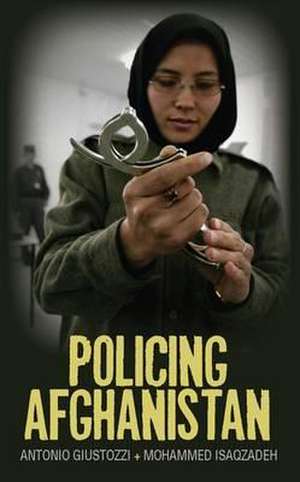Giustozzi, A: Policing Afghanistan
Autor Antonio Giustozzi, Mohammed Isaqzadehen Limba Engleză Hardback – 17 feb 2013
Preț: 328.04 lei
Preț vechi: 387.28 lei
-15% Nou
Puncte Express: 492
Preț estimativ în valută:
62.77€ • 65.89$ • 52.10£
62.77€ • 65.89$ • 52.10£
Carte disponibilă
Livrare economică 21 martie-04 aprilie
Preluare comenzi: 021 569.72.76
Specificații
ISBN-13: 9781849042055
ISBN-10: 1849042055
Pagini: 256
Ilustrații: illustrations
Dimensiuni: 223 x 149 x 20 mm
Greutate: 0.44 kg
Editura: C Hurst & Co Publishers Ltd
ISBN-10: 1849042055
Pagini: 256
Ilustrații: illustrations
Dimensiuni: 223 x 149 x 20 mm
Greutate: 0.44 kg
Editura: C Hurst & Co Publishers Ltd
Notă biografică
Antonio Giustozzi is a Research Fellow at the Crisis States Research Centre, London School of Economics. His two most recent books, both published by Hurst, are Empires of Mud: Wars and Warlordism in Afghanistan and Decoding the New Taliban: Insights from the Afghan Field, which he edited. Mohammed Isaqzadeh holds an MPhil from Oxford University and teaches at the American University in Kabul. He is co-author of a paper on Afghanistan's paramilitary policing.
Recenzii
'This is the first serious, comprehensive and convincing account of how policing in Afghanistan really works. Giustozzi and Isaqzadeh's impressive study of the political dynamics of Afghan policing extends the police-studies agenda and is essential reading for anyone interested in the political economy - or reform - of policing.' - Alice Hills, Chair of Conflict and Security, University of Leeds, and author of Policing Post-Conflict Cities 'Policing Afghanistan is the most comprehensive account to date of the history of policing in Afghanistan, especially of the critically important and yet highly problematic post-2001 efforts to rebuild an effective police force in Afghanistan. The book contains a wealth of details about the structure and organization of the police, recruitment and retention issues, and the various reform efforts of the past decade. The most useful contribution of the book, however, is that it looks at policing not simply from a technocratic perspective, which other studies of police reform efforts in Afghanistan have tended to do, but as an inherently political task. By placing police reform efforts in their political context, and examining the political economy of policing, this study provides a much clearer and compelling explanation for the successes and many more failures of internationally-driven police reform efforts in Afghanistan.' - Andrew WIlder, Director of Afghanistan and Pakistan Programs, United States Institute of Peace, and author of Cops or Robbers? The Struggle to Reform the Afghan National Police
